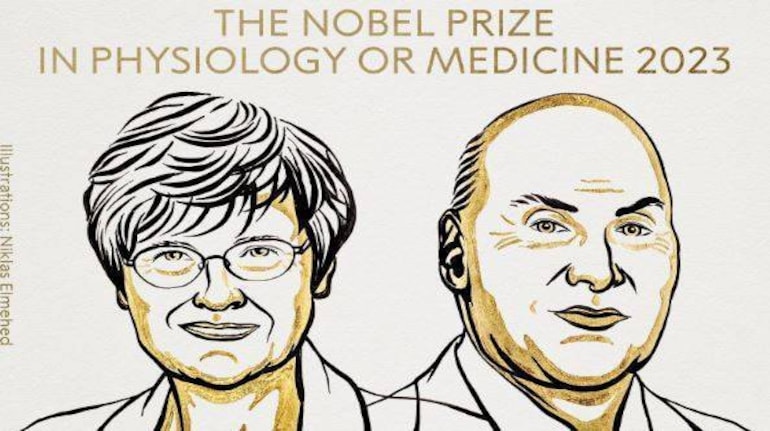



The Nobel Prize 2023 in Physiology or Medicine was awarded to Katalin Karikó and Drew Weissman for their discoveries concerning nucleoside base modifications that enabled the development of effective mRNA vaccines against COVID-19.
The top honour was given by the Nobel Assembly at Karolinska Institute on October 2 as the prestigious ceremony kicks in.
The discoveries by the two Nobel Laureates were critical “for developing effective mRNA vaccines against COVID-19 during the pandemic that began in early 2020,” a statement released on the official website stated.
In vitro produced mRNA is seen by dendritic cells as a foreign material, which causes them to become activated and release inflammatory signalling molecules, as discovered by Karikó and Weissman. Karikó and Weissman came to the conclusion that specific characteristics were required to separate the various mRNA types.
Karikó and Weissman demonstrated in research presented in 2008 and 2010 that the administration of mRNA produced with base changes significantly boosted protein synthesis compared to unmodified mRNA, it added.
Through their discoveries that base modifications ‘both reduced inflammatory responses and increased protein production’, Karikó and Weissman had eliminated critical roadblocks on the path to clinical applications of mRNA, it further added.
ALSO READ: What is a Nobel Prize? What do the winners take home? Answers to these and more
“Through their fundamental discoveries of the importance of base modifications in mRNA, this year’s Nobel laureates critically contributed to this transformative development during one of the biggest health crises of our time”, according to the statement released by Nobel Assembly.
The Nobel Prize awards, first handed out in 1901, were created by Swedish inventor and philanthropist Alfred Nobel in his 1895 will to celebrate those who have "conferred the greatest benefit on mankind."
The award in Physiology or Medicine is given for a significant discovery in either biology or medicine. The Nobel Prize is given for discoveries that have profoundly benefited humanity and altered the course of science; lifetime achievements or positions of scientific leadership are not eligible.
Between 1901 and 2022, 225 Nobel Laureates received 113 awards of the Nobel Prize in Physiology or Medicine. Previously, Svante Pääbo was awarded the prize for Physiology in 2022 "for his discoveries concerning the genomes of extinct hominins and human evolution".
In terms of reward, The Nobel Foundation, the organisation in charge of award administration, increased the prize money this year by 10 percent to 11 million kronor ($1 million). When the recipients receive their Nobel Prizes at the award ceremonies in December, they also get a diploma and an 18-carat gold medal.
Following today's award ceremony, there will be announcements for the awards in physics, chemistry, literature, peace, and economics, with one every day throughout the week until October 9.
History of Alfred Nobel:
Alfred Nobel, a Swedish scientist and businessman in the 19th century, founded the Nobel Prizes. His claim to fame prior to receiving the Nobel Prizes was creating dynamite by combining nitroglycerine with a substance that made the explosion more stable. He possessed more than 300 patents.
Discover the latest Business News, Sensex, and Nifty updates. Obtain Personal Finance insights, tax queries, and expert opinions on Moneycontrol or download the Moneycontrol App to stay updated!
Find the best of Al News in one place, specially curated for you every weekend.
Stay on top of the latest tech trends and biggest startup news.